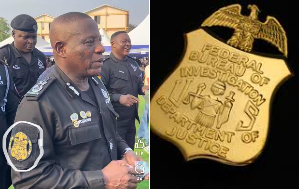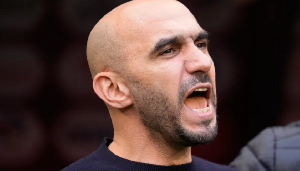...A Mad Dog On The Prowl
A twi proverb says “if you have not seen death before, look at sleep.” In the same vain, those who have not experience civil war before should read about one or watch a film about one.
Hotel Rwanda and Sometime In April provide a good insight to the Rwandan genocide which was sparked off on April 6, 1994 and which left close to 1million Rwandans dead in just 100 days. The number of people left with limbs hacked off is in the thousands.
Anyone who has watched these two films will applaud the Supreme Court in Ghana for endeavouring to ensure that Ghana does not go down the path Rwanda went. For indeed, leadership struggle, the monster that plunged Rwanda into that senseless civil war has reared its ugly head in Ghana with one party disputing the electoral victory of another.
The difference between the leadership struggle in Rwanda and the one here in Ghana is that the aggrieved party in the case of Ghana has confidence in the judiciary and has therefore gone there for re-dress. This means that Ghana will have gone down the path of Rwanda had the aggrieved party decided it does not have confidence in the judiciary. This, again, ultimately means anyone who is undermining the authority and integrity of the Supreme Court wants Ghana to rather go down the path of Rwanda. Is it that what we want?
Violence rears its head when people believe state institutions no longer have the authority and integrity to ensure justice. When a people catch and lynch a thief, is it not because they believe the police and the judiciary will not punish the thief adequately? Undermining the judiciary, especially the Supreme Court, is therefore calling for national chaos. In the light of this, many Ghanaians welcomed the touchline warning on July 2, 2013 given by the President of the nine-member panel of the Supreme Court hearing the election petition case. The warning seeks to preserve the authority and integrity of the court, ultimately to ensure that Ghana will not go down the path of countries like Rwanda.
Unfortunately, some recalcitrant members of the society decided to ignore the warning. The Supreme Court quickly asserted its authority and acted with the speed of imagination.
Stephen Atubiga of the NDC and Ken Kuranchie got sentenced to 3 and 10 days respectively for undermining the authority and integrity of the court.
Since then, some have sought to rubbish the Supreme Court for its decision to haul before it those who try to undermine its authority. Among those who have attacked the SC in this regard are a Prof. Kweku Asare, who is conveniently sojourning in the USA and will not suffer directly if the recklessness of an irresponsible press plunges the country into civil war as it did in Rwanda. The CDD last week held a seminar on Press Freedom & Contempt at which some of the speakers only came to show there that they have the garb. In all their speech, apart from the speaker from the Ghana Bar Association(GBA),they did not consider the security of the state. As usual, it was a seminar organized by a ‘friend’ of the press. It was covered by the press. Many of the Speakers are press men. So, in the end, what was witnessed is yet another attempt by the press to set its own laws and bastardize anyone who does not agree with them.
The vast majority of Ghanaians appreciate the effort of the Supreme Court to ensure that Ghana does not go down the abyss. No group of persons, political party, individuals or professionals is bigger than the state. And, certainly, the press cannot be bigger than Ghana. Neither can press freedom be more important than the stability and security of the state. Anyone who has studied the Rwandan genocide knows that while the war had remote and immediate causes, it was fueled by the media.
According to Wikipedia, the online encyclopedia, “…the news media played a crucial role in the genocide;
local print and radio media fueled the killings while the international media either ignored or seriously misconstrued events on the ground. The print media in Rwanda is believed to have started hate speech against Tutsis, which was later continued by radio stations. According to commentators, anti-Tutsi hate speech "...became so systemic as to seem the norm." The state-owned newspaper Kangura had a central role, starting an anti-Tutsi and anti-RPF campaign in October 1990. In the ongoing International Criminal Tribunal for Rwanda, the individuals behind Kangura have been accused of producing leaflets in 1992 picturing a machete and asking "What shall we do to complete the social revolution of 1959?" – a reference to the Hutu revolt that overthrew the Tutsi monarchy and the subsequent politically orchestrated communal violence that resulted in thousands of mostly Tutsi casualties and forced roughly 300,000 Tutsis to flee to neighboring Burundi and Uganda. Kangura also published the infamous "Hutu Ten Commandments", which regulated all dealings with Tutsis and how Hutus were to treat them. It communicated the message that the RPF had a devious grand strategy against the Hutu (one feature article was titled "Tutsi colonization plan").
Due to high rates of illiteracy at the time of the genocide, radio was an important way for the government to deliver messages to the public. Two radio stations key to inciting violence before and during the genocide were Radio Rwanda and Radio Télévision Libre des Mille Collines. In March 1992, Radio Rwanda was first used in directly promoting the killing of Tutsi in Bugesera, south of the national capital Kigali. Radio Rwanda repeatedly broadcast a communiqué warning that Hutus in Bugesera would be attacked by Tutsi, a message used by local officials to convince Hutu that they needed to attack first. Led by soldiers, Hutu civilians and its militia called Interahamwe attacked and killed hundreds of Tutsi. At the end of 1993, the RTLM's highly sensationalized reporting on the assassination of the Burundian president, a Hutu, was used to underline supposed Tutsi brutality. The RTLM falsely reported that the president had been tortured, including castration (in pre-colonial times, some Tutsi kings castrated defeated enemy rulers). There were 50,000 civilian deaths in Burundi in 1993.
From late October 1993, the RTLM repeatedly broadcast themes developed by the extremist written press, underlining the inherent differences between Hutu and Tutsi, the foreign origin of Tutsi, the disproportionate share of Tutsi wealth and power, and the horrors of past Tutsi rule. The RTLM also repeatedly stressed the need to be alert to Tutsi plots and possible attacks. It warned Hutu to prepare to "defend" themselves against the Tutsi. After April 6, 1994, authorities used RTLM and Radio Rwanda to spur and direct killings, specifically in areas where the killings were initially resisted. Both radio stations were used to incite and mobilize populations, followed by specific directions for carrying out the killings.
The RTLM had used terms such as inyenzi (cockroach in Kinyarwandan) and Tutsi interchangeably with others referring to the RPF combatants. It warned that RPF combatants dressed in civilian clothes were mingling among the displaced people fleeing combat zones. These broadcasts gave the impression that all Tutsi were supporters of the RPF force fighting against the elected government. Women were targets of the anti-Tutsi propaganda prior to the 1994 genocide; for example, the "Hutu Ten Commandments" (1990) included four commandments that portrayed Tutsi women as tools of the Tutsi people, and as sexual weapons to weaken and ultimately destroy the Hutu men. Gender-based propaganda also included cartoons printed in newspapers depicting Tutsi women as sex objects. Examples of gender-based hate propaganda used to incite war rape included statements by perpetrators, such as "You Tutsi women think that you are too good for us", and "Let us see what a Tutsi woman tastes like."
Today, having experienced the brutality and horrors of civil war, Rwandans have zero tolerance for a reckless press. They have zero tolerance for hate speech. They have zero tolerance for genocidal speech. And indeed, if Kennedy Agyepong, MP for Assin Central had been a Rwandan, he would have been locked away and the keys of his cell thrown into the sea for the genocidal statements he has become infamous for.
Let those who are trying to stampede the Supreme Court therefore realize the harm they are doing to Ghana. Their quotation of articles in the constitution to back their point is unimpressive. Even the devil quoted the bible when it suited him. A free but reckless and irresponsible press is like a mad dog on the loose. It must be caged. If the pen is mightier than the sword, then a reckless and irresponsible pen is more dangerous than a reckless and irresponsible sword. Justice Atuguba and his colleagues must continue in the direction they have chosen in the interest of the silent majority of Ghanaians, not the noisy minority. If after the final touchline warning people deliberately choose to be in contempt of the Supreme Court by attacking its integrity and authority, why should we spare a tear for them.
Opinions of Thursday, 18 July 2013
Columnist: Daily Post














